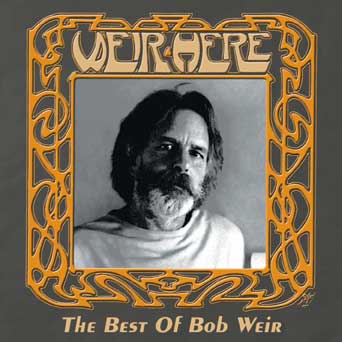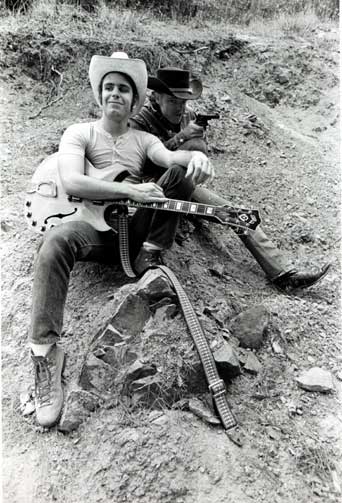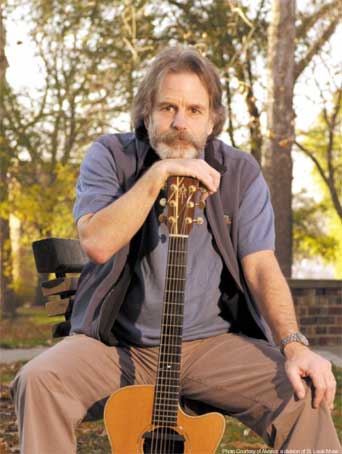
|
Track Listings
Disc: 2 • Live Tracks
|
| full press release:
On March 23, Hybrid Recordings will release "Weir Here," a two-CD retrospective of Bob Weir’s career that will document one of the most remarkable bodies of work in recent musical history. The package will include 26 songs recorded over the past 33 years both in concert and in the studio and with several different configurations, most notably the Grateful Dead but also with Kingfish, Bobby and the Midnites, Rob Wasserman and Neil Young, and Bob’s current group, RatDog. Perhaps more importantly, "Weir Here" spans not only time but also genres, touching almost every corner of American music in the late 20th century. History will record that Bob Weir used the time he spent next to an icon to become ever more creative himself, writing rich, challenging songs and becoming a great rhythm guitarist. In the process, he also became a superb vocal interpreter, fashioning classic versions of tunes by Bob Dylan, Kris Kristofferson, Marty Robbins, and Chuck Berry (among many others). "Weir Here" depicts all of the facets of his musical identity. A complete list of tracks follows, but some special highlights include a sampling from Weir’s solo albums, beginning with "Ace" ("Cassidy," "Mexicali Blues," "Playing in the Band"), on which he was backed by the Grateful Dead. "Easy Answers," a collaboration with Rob Wasserman and Neil Young, is from Wasserman’s "Trios" album. Lowell George’s "Easy to Slip" comes from Weir’s "Heaven Help the Fool." "Two Djinn" and "Ashes and Glass" come from the first-rate although somewhat overlooked first RatDog studio album, "Evening Moods." Another one-off collaboration – "Wabash Cannonball," with Dan Zanes for his album "House Party," is a very special bonus. Of course, Weir is rightly associated with live music, and there is a wealth of that. The bulk of the live cuts feature him with the Grateful Dead, and in addition to great tracks from Dead vault releases – Weir-composed classics like "Truckin’", "Estimated Prophet," and "Sugar Magnolia" - there are previously unreleased versions of "Man Smart, Woman Smarter," "Hell in a Bucket," and "Me and Bobby McGee," among others. Finally, there’s a gem from RatDog, a rehearsal version (recorded the first session after the "shock and awe" bombing of Iraq began) of Bob Dylan’s "Masters of War." Studio Disc: Bob Weir Bio Bob Weir already has a secure place in rock history as the Grateful Dead’s co-vocalist and what Andrew Clarke (in one of England’s leading newspapers, "The Independent") called the genre’s "greatest, if most eccentric rhythm guitarist." But listening to "Weir Here" reveals a songwriter who fused fragments of a broad span of American and European music into a repertoire that demands serious critical attention. When you have a modest, anti-promotional personality – and when you spend 30 years next to an icon – it’s easy to fall under the radar. But if you listen to "Weir Here," such a low profile is impossible to justify. Bob Weir really is one of the genuinely gifted, distinctive songwriters of the late 20th century. There’s a second reason he doesn’t always get quite the attention he deserves. Although always a gentleman, Bob Weir can be…contrary. This is the man who, when his muse required that he go study music, chose McCoy Tyner – not exactly a rock rhythm guitarist – as his model. And just as his personality has a discriminating antiauthoritarian streak that leads him down his own road, his composing is just as distinctive and impossible to classify. So that in "Lazy Lightnin’" he combined r & b/disco chords and a time signature in 7. His go-your-own-way point of view is perfectly articulated in John Barlow’s lyrics for "Throwin’ Stones," which Weir called an "anarchist diatribe." And the dry, offbeat humor of so many of his songs lets you know – his is a nuanced, special voice. Bob Weir was born in San Francisco in 1947 and grew up in the suburb of Atherton. After less-than-popular-with-the-family-and-neighbors experiences with piano and trumpet, he glommed onto the guitar at the age of 13, and hasn’t let go since. He soon became the most-junior member of a folk scene that centered on a Palo Alto, California, club called the Tangent, which hosted such future legends as Jerry Garcia, Jorma Kaukonen, and Janis Joplin. Kaukonen was his guitar-picking role model (Garcia, at that time, was a banjo player), and Weir soon became a full-fledged, if young, folkie, listening to Lightnin’ Hopkins, Joan Baez, and the Greenbriar Boys, as well as the Everly Brothers and Chuck Berry. By 1964, at the age of 17, he’d become a fixture at a Palo Alto music store called Dana Morgan’s. That summer, when Jerry Garcia went off on a bluegrass odyssey, Weir assumed responsibility for his guitar students. In the wake of "A Hard Day’s Night," rock and roll had swept away even the most purist folkies’ doubts, so that when late that year Ron "Pigpen" McKernan urged Garcia to electrify their jug band instruments and become a rock band, Bob Weir – already a Beatlemaniac – evolved from jug to the rhythm guitar chair. They started as the Warlocks, played a lot of bars, and then in the fall of 1965 underwent a trial by fire, serving as the "house band" for a series of psychedelic explorations thrown by Ken Kesey and the Merry Pranksters, the "acid tests." By early 1966, the tests had grown into events involving many thousand people, and history was never quite the same. And the Warlocks had become not only unimaginably fused brothers, but also the Grateful Dead. Weir was "the kid," and while his first Dead song, "The Other One," was not only brilliant and enduring – The Dead play it to this day – his early songwriting had its up and downs. His next song, "Born Crosseyed," was actually out of his vocal range, and for a while he gave up songwriting. Finally, in 1970, he regained focus with a number of tunes. One was "Cassidy," about a young woman of that name whose birth he attended, combined with the same-sounding legendary hero of "On the Road" and the acid tests, Neal Cassady. With this and other songs, he began a songwriting partnership with John Perry Barlow, an old school friend, which would last 20 years and more. After adding legendary songs like "Truckin’" and "Sugar Magnolia" (written with Robert Hunter) to the 1970 Grateful Dead masterpiece "American Beauty," in 1971 Weir proposed to do his first solo album, which would be called "Ace." For various reasons, his backup band turned out to be, for the most part, the Dead. The album was a classic, and it’s no surprise that five songs from it made it on to the "Weir Here" list, including "Playing in the Band," "Cassidy," and "Mexicali Blues." In 1974, the Dead took a nearly two-year vacation (their only lengthy break in 30 years), and during that period Weir took up with a band called Kingfish, really his first side effort from the Dead. Weir took from Kingfish – aside from a massive amount of fun – the songs "Lazy Lightnin’" and "Supplication," and a huge dose of encouragement for the idea that, in order to be a creative contributor to the Dead, he needed to do things for himself. As a result, the year after the "Kingfish" album was released (1976), he began a solo project with producer Keith Olsen that would come to be called "Heaven Help the Fool." A brief tour to support that album brought him in contact with various session players, including, eventually, Brent Mydland (who would join the Dead in 1979), Bobby Cochran, Alphonso Johnson, and Billy Cobham. This was the genesis for Bobby and the Midnites, who would tour in the early 1980s and produce two albums, including the eponymous debut album, here represented by "(I Want to) Fly Away." Later in the ‘80s, Weir hooked up with the talented multi-genre bassist Rob Wasserman at a benefit, forging a partnership that would last 15 years. They began as a duo. Working on Rob’s album "Trios," they joined forces with Neil Young to produce "Easy Answers," and then in the period after Jerry Garcia’s death in 1995, added drummer Jay Lane and ex-Kingfish harmonica/guitar player Matthew Kelly to become a blues band called the Ratdog Review. Eventually, Rob moved on, and a settled lineup featuring Lane, keyboardist Jeff Chimenti, lead guitarist Mark Karan, reeds man Kenny Brooks, and bassist Robin Sylvester was RatDog. The band is touring as we speak (Spring 2004), and looks to do so for a good long while into the future. Although his life has been consumed by music, Weir has spent a good deal of time as a social activist. His work on behalf of Seva (which fights blindness in Asia and South America – he’s a member of the Board) and as an environmental activist (with Greenpeace and the Rainforest Action Network, among others) have been his primary focus as an individual, along with his work with the Dead’s own Rex Foundation. He’s not only performed at a zillion benefits but also given deeply of his time, including lobbying Congress on various forestry issues. He turned his love for vegetarian cookery into a fund-raiser for various nonprofits, selling various cooking sauces (go to www.dead.net for more info) on their behalf. On the current RatDog tour, he’s also making sure that Head Count, a voter-registration effort, is getting special support in this election year. He is married to the former Natascha Muenter; they have two young daughters, Monet and Chloe. A long, strange, and very creative trip. And not remotely over. |
|





